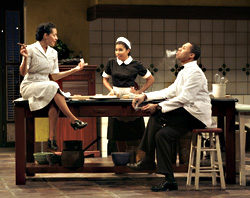“World Premiere” is one of those lovely phrases that hangs between hype and simple description. Yes, the premiere of a new play is an extraordinary time, a singular rendezvous where a script, a cast, and an audience first meet. But it’s hardly a novelty. Virtually every regional theater in the country features several “world premieres” each year.
Seattle Children’s Theatre, for example, has two in its just-announced season, and the Rep has two “under consideration” by artistic director David Esbjornson. This year’s biggest premiere, at least in size and budget, is the upcoming August production of Shrek the Musical at the 5th Avenue, a Broadway-bound concoction that hopes to follow in the successful steps of Hairspray and Young Frankenstein. (Musical producers prefer their premieres to be on Broadway and their “out-of-town tryouts” in places like Seattle. Young Frankenstein, for example, “premiered” at the Paramount, but, despite hefty ticket prices, the producers treated the whole run as previews, making significant cuts and changes here prior to their New York opening.)
Like most playwrights, I’m ambivalent about world premieres. I’m enough of a romantic to still get excited seeing the words on a poster. It can seem miraculous that there are still companies willing to commit to brand-new work, and audiences willing to risk seeing it. But a standard gripe among playwrights is that theaters have fetishized world premieres, and lose interest if they can’t be the very first company to produce a show.
Perhaps with good reason.
“From the theater’s perspective, there are both financial and professional gains to be made from having the ‘first’ production,” explains the head of the Dramatists Guild, Gary Garrison. “A lot of theaters depend on state and federal funding that specify original programming and world premieres in their mandate. And with so little money to spread around—from the community, city, state, and federal funding sources—theaters stick tight to their mandates in order to remain competitive.”
And yet, as Esbjornson says, “It usually takes more than one production to develop a script fully.” As an example he mentions Eduardo Machado’s The Cook, which had several productions before coming to Seattle last year. “It wasn’t until we did it here that the playwright was able to make the rewrites that gave him the strongest third act the play has had.” But of course at that point the Rep could no longer boast about a world premiere.
There are signs that the whole idea may be losing its cachet. New works dominated Esbjornson’s first Rep season back in 2005, and they’ve been a major component of the seasons since. But in conversation, it’s clear he’s begun to believe that Seattle audiences want new work only when it’s leavened with a mix of classics and recent New York hits. “There’s tremendous value in being the first theater to take the risk of doing a play,” he says. “I don’t want to back away from that. But I don’t think you get that much hype these days out of a world premiere.” Linda Hartzell over at Seattle Children’s Theatre says new work has become so routine at her venue that it’s scarcely mentioned on press releases any more. “I think the days of world premieres being given special attention are kind of over,” she admits.
“Theater’s kinesthetic. You really need to see it all up on its feet,” says Hartzell. She credits past dramaturge Deborah Lynn Frockt with setting up guidelines to ensure successful play development, including commissioning work from playwrights two or three years in advance of production and giving each play a formal workshop period, followed by “zillions of hours with the playwright.” The result has been a string of successive productions for the majority of shows that premiered at SCT, and Hartzell currently has “around 10” scripts in various stages of development.
What this tells me is that the success of a world premiere depends on theaters being willing to give new work additional time and energy, to stage not just premieres but subsequent productions that help refine a work into something worth seeing again years from now.
John Longenbaugh








